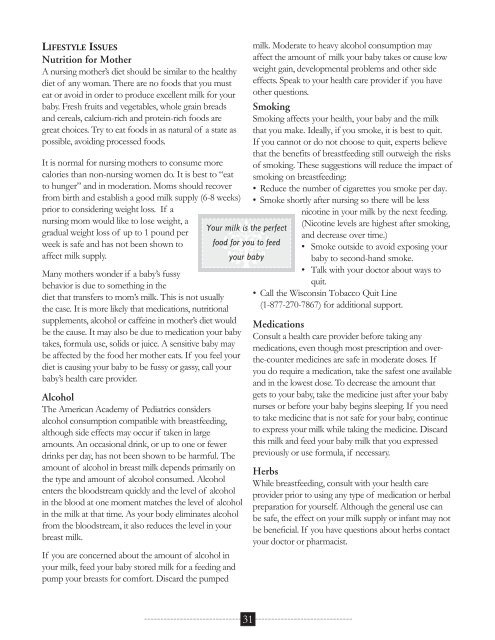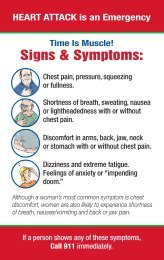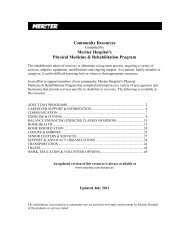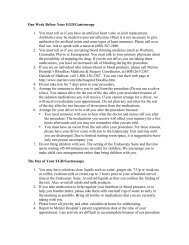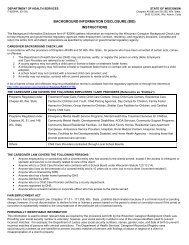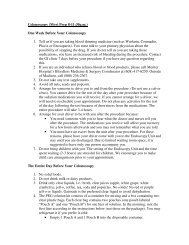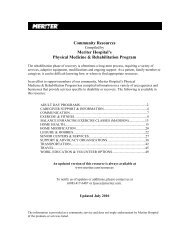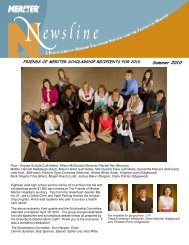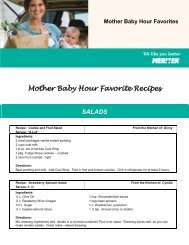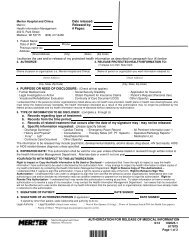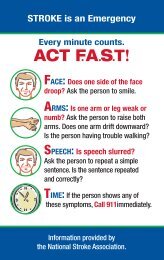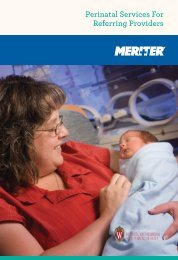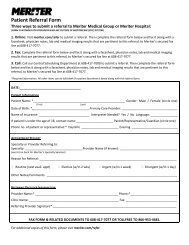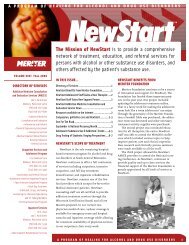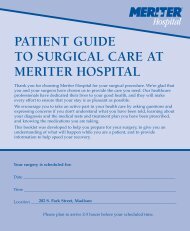A Guide To Your New Family's First Weeks - Meriter Health Services
A Guide To Your New Family's First Weeks - Meriter Health Services
A Guide To Your New Family's First Weeks - Meriter Health Services
Create successful ePaper yourself
Turn your PDF publications into a flip-book with our unique Google optimized e-Paper software.
Lifestyle Issues<br />
Nutrition for Mother<br />
A nursing mother’s diet should be similar to the healthy<br />
diet of any woman. There are no foods that you must<br />
eat or avoid in order to produce excellent milk for your<br />
baby. Fresh fruits and vegetables, whole grain breads<br />
and cereals, calcium-rich and protein-rich foods are<br />
great choices. Try to eat foods in as natural of a state as<br />
possible, avoiding processed foods.<br />
It is normal for nursing mothers to consume more<br />
calories than non-nursing women do. It is best to “eat<br />
to hunger” and in moderation. Moms should recover<br />
from birth and establish a good milk supply (6-8 weeks)<br />
prior to considering weight loss. If a<br />
nursing mom would like to lose weight, a<br />
gradual weight loss of up to 1 pound per<br />
week is safe and has not been shown to<br />
affect milk supply.<br />
Many mothers wonder if a baby’s fussy<br />
behavior is due to something in the<br />
diet that transfers to mom’s milk. This is not usually<br />
the case. It is more likely that medications, nutritional<br />
supplements, alcohol or caffeine in mother’s diet would<br />
be the cause. It may also be due to medication your baby<br />
takes, formula use, solids or juice. A sensitive baby may<br />
be affected by the food her mother eats. If you feel your<br />
diet is causing your baby to be fussy or gassy, call your<br />
baby’s health care provider.<br />
Alcohol<br />
The American Academy of Pediatrics considers<br />
alcohol consumption compatible with breastfeeding,<br />
although side effects may occur if taken in large<br />
amounts. An occasional drink, or up to one or fewer<br />
drinks per day, has not been shown to be harmful. The<br />
amount of alcohol in breast milk depends primarily on<br />
the type and amount of alcohol consumed. Alcohol<br />
enters the bloodstream quickly and the level of alcohol<br />
in the blood at one moment matches the level of alcohol<br />
in the milk at that time. As your body eliminates alcohol<br />
from the bloodstream, it also reduces the level in your<br />
breast milk.<br />
If you are concerned about the amount of alcohol in<br />
your milk, feed your baby stored milk for a feeding and<br />
pump your breasts for comfort. Discard the pumped<br />
<strong>Your</strong> milk is the perfect<br />
food for you to feed<br />
your baby<br />
milk. Moderate to heavy alcohol consumption may<br />
affect the amount of milk your baby takes or cause low<br />
weight gain, developmental problems and other side<br />
effects. Speak to your health care provider if you have<br />
other questions.<br />
Smoking<br />
Smoking affects your health, your baby and the milk<br />
that you make. Ideally, if you smoke, it is best to quit.<br />
If you cannot or do not choose to quit, experts believe<br />
that the benefits of breastfeeding still outweigh the risks<br />
of smoking. These suggestions will reduce the impact of<br />
smoking on breastfeeding:<br />
• Reduce the number of cigarettes you smoke per day.<br />
• Smoke shortly after nursing so there will be less<br />
nicotine in your milk by the next feeding.<br />
(Nicotine levels are highest after smoking,<br />
and decrease over time.)<br />
• Smoke outside to avoid exposing your<br />
baby to second-hand smoke.<br />
• Talk with your doctor about ways to<br />
quit.<br />
• Call the Wisconsin <strong>To</strong>bacco Quit Line<br />
(1-877-270-7867) for additional support.<br />
Medications<br />
Consult a health care provider before taking any<br />
medications, even though most prescription and overthe-counter<br />
medicines are safe in moderate doses. If<br />
you do require a medication, take the safest one available<br />
and in the lowest dose. <strong>To</strong> decrease the amount that<br />
gets to your baby, take the medicine just after your baby<br />
nurses or before your baby begins sleeping. If you need<br />
to take medicine that is not safe for your baby, continue<br />
to express your milk while taking the medicine. Discard<br />
this milk and feed your baby milk that you expressed<br />
previously or use formula, if necessary.<br />
Herbs<br />
While breastfeeding, consult with your health care<br />
provider prior to using any type of medication or herbal<br />
preparation for yourself. Although the general use can<br />
be safe, the effect on your milk supply or infant may not<br />
be beneficial. If you have questions about herbs contact<br />
your doctor or pharmacist.<br />
31


